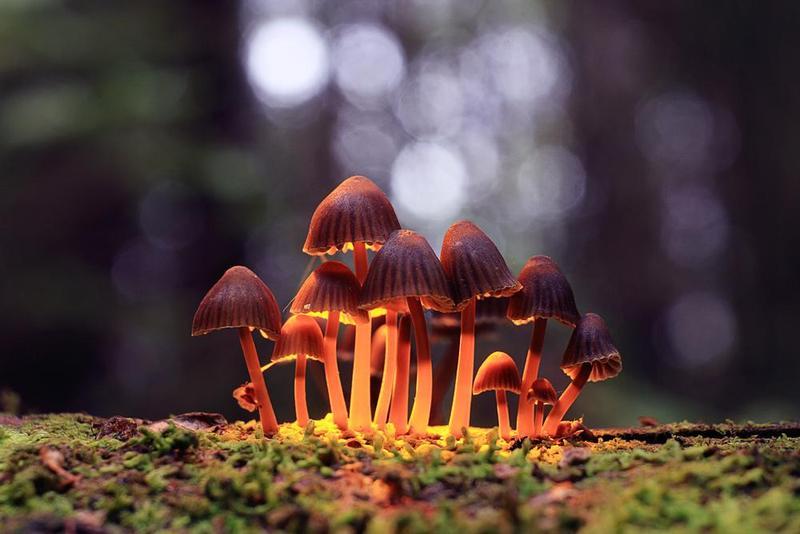Magic Mushrooms Are Shaping the Future of Psychiatric Treatment
Magic Mushrooms Are Shaping the Future of Psychiatric Treatment
You may know the chemical 4-phosphoryloxy-N,N-dimethyltryptamine by its more common name, psilocybin. Long used as a sacrament among indigenous peoples in the Americas — and more recently branded as an illicit party drug — in recent years, the active ingredient in psychedelic mushrooms has received a lot of attention from scientists for potential to treat substance use disorder, anxiety, and depression.
Adding to the growing body of scientific literature supporting psilocybin-based therapy, on May 8 a team of researchers reported in the Journal of Psychoactive Drugs that it’s even more effective than traditional psychiatric therapies.
In their review of seven published psilocybin clinical trials, the team led by Kelan Thomas, assistant professor of clinical sciences at Touro University California, concluded that psilocybin-assisted psychotherapy shows strong potential for improving outcomes in patients living with depression, anxiety, and substance use disorder. The advantage of psilocybin-assisted therapy, they write, is that it provides significant benefits for patients who haven’t responded to therapy or medication. Patients can also show improvement after just a few six-hour “medicated” therapy sessions and a few weeks of follow-up therapy.
Long used as a sacrament among indigenous peoples, psilocybin mushrooms are now taking on a medical role.
This doesn’t mean you should chow down on mushrooms to treat your own psychological issues quite yet, though. These studies all investigated the use of psilocybin in strictly controlled clinical conditions under the supervision of therapists and other health professionals. Additionally, all of the clinical trials investigated by the researchers consisted of small groups of subjects — as few as nine for an open-label (non-blinded) trial investigating obsessive-compulsive disorder and as many as 51 in a double-blind study of cancer-related depression and anxiety. But even 51 test subjects constitutes far too small a trial for scientists to consider it sufficient evidence to draw conclusions.
“Additional studies are required to determine if psilocybin will be deemed safe and effective enough to gain FDA approval,” the researchers write. “While psilocybin’s clinical utility still remains uncertain, it should be investigated further to determine if this novel treatment paradigm has the potential to dramatically improve outcomes in patients with psychiatric disorders.”
As psychological and psychiatric researchers have gained greater access to brain imaging technologies like fMRI, scientists have formed new hypotheses about the physiological roots of psychological disorders. One of these, the authors note, is the idea that major depression is rooted in atypical connections between regions of the brain that aren’t usually connected, which may in turn underlie the fixation and rumination on thoughts that characterizes depression.
So, the authors of this review don’t see it as a coincidence that recent studies have found that psilocybin significantly affects connectivity among different brain regions. It’s possible that the enhanced connectivity experienced during the psilocybin experience could disrupt the unhealthy connections associated with mental illness, allowing a patient’s brain to return to a normal level and pattern of connectivity as the experience subsides.
These new attitudes among scientists run counter to those of the law enforcement community. In most of the United States — New Mexico seems to have found a loophole — psilocybin is still classified as a Schedule I substance. This means it has “a high potential for abuse, no currently accepted medical use in treatment in the United States, and a lack of accepted safety for use under medical supervision,” according to the Drug Enforcement Administration. When — or whether — the DEA will take the most recent scientific data into account, however, remains to be seen.
Recent research suggests that functional connectivity changes may be involved in the pathophysiology of psychiatric disorders. Hyperconnectivity in the default mode network has been associated with psychopathology, but psychedelic serotonin agonists like psilocybin may profoundly disrupt these dysfunctional neural network circuits and provide a novel treatment for psychiatric disorders.
We have reviewed the current literature to investigate the efficacy and safety of psilocybin-assisted therapy for the treatment of psychiatric disorders. There were seven clinical trials that investigated psilocybin-assisted therapy as a treatment for psychiatric disorders related to anxiety, depression, and substance use.
All trials demonstrated reductions in psychiatric rating scale scores or increased response and remission rates. There were large effect sizes related to improved depression and anxiety symptoms. Psilocybin may also potentially reduce alcohol or tobacco use and increase abstinence rates in addiction, but the benefits of these two trials were less clear due to open-label study designs without statistical analysis. Psilocybin-assisted therapy efficacy and safety appear promising, but more robust clinical trials will be required to support FDA approval and identify the potential role in clinical psychiatry.
Be the first to post a message!
